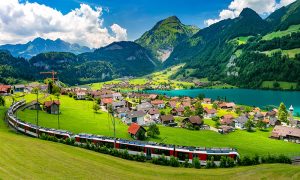New Zealand, with its beautiful natural scenery, safe social environment, high quality education and healthcare system, has become a favorite destination for manyimmigrantsthe land of dreams. However, successImmigration to New ZealandIt is not a simple task and requires a detailed understanding of all aspects of the application process, visa types and cost of living. This article will provide you with a comprehensive guide to immigrating to New Zealand to help you better plan and achieve this goal.
I. Main types of visas for New Zealand immigrants
Depending on the needs and background, New Zealand offers a variety of immigrant visa types, the following are some of the most common:
1. skilled migrantVisa (Skilled Migrant Category)
This is one of the most popular immigration routes in New Zealand and is suitable for applicants with specific skills and work experience.
Terms of Application:
- Not more than 55 years of age.
- English proficiency meets the requirements (e.g. IELTS average of 6.5 or above).
- Obtain an EOI (Expression of Interest) score of at least 160.
- Have skills on the New Zealand Shortage Occupation List, or have been offered a job in New Zealand.
2. business migrantVisa (Entrepreneur Work Visa)
Suitable for investors or entrepreneurs planning to start a business in New Zealand.
Terms of Application:
- Provide a detailed business plan.
- Minimum investment of N100,000 (exemptions may be granted in exceptional circumstances).
- Score of 120 or more, including factors such as age and business experience.
3. investment immigrationVisa (Investor Visa)
There are Investment Class I and Class II visas for high net worth individuals:
- Investment category 1 (Investor 1): The minimum investment is N10 million with no age limit.
- Investment II (Investor 2): The minimum investment is N3 million and the age limit is below 65 years.
4. Family Category Visa (FCV)
Provides reunification opportunities for applicants who already have an immediate family member in New Zealand, such as a parent, partner or child.
II. New Zealand Immigration Application Process
1. Evaluate your own conditions
Before applying, it is advisable to assess whether you meet the requirements of the relevant visa through the online tool on the official website of Immigration New Zealand or through a professional immigration consultant.
2. Submit an Expression of Interest (EOI)
with regards toskilled migrantThe EOI form needs to be filled out with detailed information including age, education, work experience, etc. An invitation from the USCIS may be received only after the EOI score meets the minimum requirements.
3. Preparation of application materials
After receiving the invitation, you need to prepare relevant supporting documents, such as passport, academic certificates, work certificates, medical reports and certificates of no criminal record.
4. submit an application
Submit a complete application through the official website of the Immigration Department or offline and pay the relevant fees.
5. Waiting for the trial result
Processing time varies depending on the type of visa and usually takes several months. During this time, the Immigration Department may request additional documents.
6. Obtaining a visa and landing
Upon approval, the applicant can land in New Zealand and start a new life under the visa category.
Analysis of the cost of living in New Zealand
1. shelter
Housing is the largest expense in the cost of living in New Zealand. Below is a reference to the cost of renting accommodation in major cities:
- Oakland (California, US city): Rent for a one bedroom apartment is about N400-600 per week.
- Wellington, capital of New Zealand: Rent is slightly lower at about N350-500 per week.
- Christchurch (New Zealand city): Relatively affordable at N300-450 per week.
2. Food & Daily necessities
Food prices are high in New Zealand and the following are common expenses:

- Milk (2L): about NZD 4.
- Bread: about N3.
- Restaurant light meals: NZD 15-25.
3. transportation
New Zealand's public transportation system is not well developed and most residents choose to drive themselves:
- Used car price: about N3000-8000.
- Price of petrol per liter: about N2.50.
- Monthly public transportation pass: approximately N$150.
4. teach
If you are emigrating with children, New Zealand offers free public education, but private school fees range from NZ$5,000 - NZ$20,000 per year.
5. medical care
New Zealand residents have access to free or low-cost health care, but non-residents are required to purchase health insurance at a cost of about NZ$50-100 per month.
Four,Immigration to New ZealandStrengths and challenges
dominance
- Secure social environment: New Zealand has one of the lowest crime rates in the world.
- Quality of life: From air quality to work-life balance, New Zealand ranks among the world's best.
- Open immigration policy: Compared with other developed countries, New Zealand's immigration policy is more relaxed.
challenge
- Higher cost of living: Especially in big cities like Auckland.
- Adapting to a new culture: The need to adapt to a different pace of life and way of working than in Asian countries.
- Complexity of the immigration process: Different visas have strict requirements and long processing times.
V. Tips for success in migrating to New Zealand
1. forward planning
Whether you are choosing a visa category or preparing documents, planning ahead can minimize unnecessary delays and mistakes.

2. Seek professional help
The complex application process can be handled more efficiently through an immigration agent or attorney.
3. Enhance your competitiveness
Skilled migrant applicants should prioritize obtaining a New Zealand qualification or job Offer, which will significantly increase the success rate of their application.
4. Be financially prepared
The cost of living in New Zealand is high and it is advisable to prepare enough money to cope with the initial period of life before emigrating.
concluding remarks
New Zealand is a beautiful country to settle, work and live in, but immigration is not easy and requires thorough preparation and patience. We hope this article can provide you with practical information and guidance to help you successfully realize theImmigration to New Zealandof your dreams. If you have further questions, it is always recommended to consult with Immigration New Zealand or a professional advisor to ensure that you are on the right track every step of the way.






